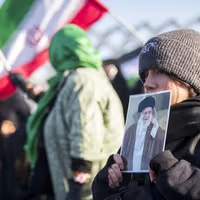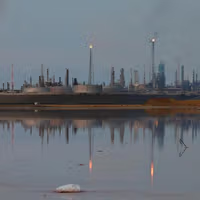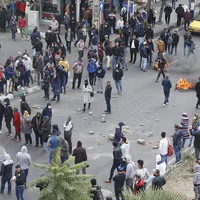Fixing Iran's gas shortages needs $45 billion, says oil minister
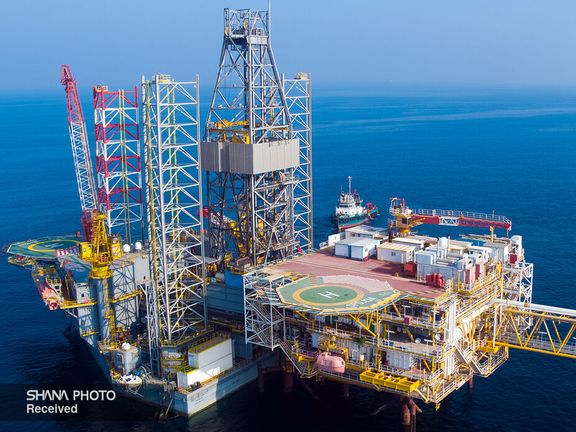
Iran needs $45 billion in investment to resolve its chronic winter energy deficit and worsening air pollution, the country's Oil Minister Mohsen Paknejad said on Wednesday.

Iran needs $45 billion in investment to resolve its chronic winter energy deficit and worsening air pollution, the country's Oil Minister Mohsen Paknejad said on Wednesday.
The funds are crucial to boost gas production to meet targets set by Iran's long-term development plan, which on paper inform budgets and industrial policies.
"According to the Seventh Development Plan, gas production must reach 1 billion and 380 million cubic meters per day by the end of the plan," Paknejad said. "To achieve this goal, $45 billion of investment is required."
The majority of this funding, he explained, must be directed towards developing gas fields and upgrading related infrastructure.
Successive Irani governments have struggled to meet soaring consumption, especially during colder months when power plants are forced to burn polluting fuels that compound the problem of air quality in urban areas.
Iran possesses vast reserves of natural gas, but rising domestic demand and lack of investment to maintain and expand the infrastructure means the country is often a net-importer of energy.
Paknejad outlined a two-pronged approach to tackle the crisis, emphasizing the urgent need for substantial investment as well as consumption management.
"More important than increasing production is managing demand and optimizing consumption," he said, emphasizing the need for greater efficiency in domestic gas usage.
Over 860 million cubic meters of processed natural gas (sweet gas) are delivered to Iran's national grid daily, the oil minister said, more than three-quarters of which is taken up by households, businesses, and small industries.
The government has called on Iranians to limit their use, but seem reluctant to press harder on the issue, mindful of the widespread discontent in the country.
Iran's oil minister alluded to this reality, while suggesting that resource management and optimization lagged behind production growth.
"Any reform in the energy consumption system should be accompanied by considering the living conditions of the people," Paknejad said.
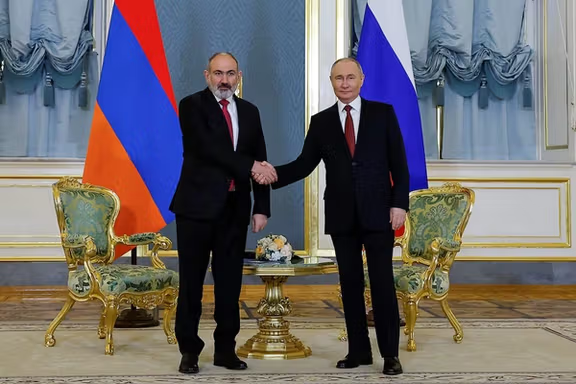
For the first time since its independence, Armenia has assumed full control over the Agarak border checkpoint along its border with Iran.
As of December 30, Armenian border guards have replaced Russian personnel who managed the checkpoint for over three decades.
Prime Minister Nikol Pashinyan announced the transition on his official Facebook page, acknowledging the service of Russian border guards and extending his wishes to the Armenian forces now in charge.
“From today on, border control is carried out only by the officers of the Republic of Armenia Border Guard Forces at the Agarak border crossing point of Armenia-Iran state border. Until now, since Armenia's independence, border control was carried out by the Russian Federation Border Guard troops officers at Agarak crossing point, and I want to thank them for their service. And I wish success and good service to our border guards who have taken over border control from today,” Pashinyan said as reported by the Newsweek.
The decision follows an agreement between Pashinyan and Russian President Vladimir Putin during an October 8 meeting. As part of the arrangement, Armenian forces will also begin managing border security with Turkey and Iran from January 1, 2025.
The move is part of broader changes in Armenia-Russia relations, which include the withdrawal of Russian guards from Zvartnots International Airport and other border locations.
Armenia’s decision to assume greater responsibility for its borders comes amid shifting alliances and a reevaluation of its reliance on Moscow, particularly after Russia’s limited response to recent conflicts involving Armenia and Azerbaijan.
In March, Yerevan called for the withdrawal of Russian guards from key locations, citing heightened tensions with its traditional ally.
The transition also reflects broader geopolitical currents. Armenia’s ties with Iran, a key regional ally, remain strong, with cooperation in energy and trade bolstering relations. The two nations share a 44-kilometer border, and Iran views Armenia as a strategic counterbalance to Azerbaijan and Turkey.
Tehran has consistently emphasized its interest in maintaining stability along its northern border, where regional conflicts often intersect with ethnic and religious divisions.
The decision has drawn criticism from Russian Ministry of Foreign Affairs, which warned that the shift could undermine Armenia’s security and economic stability. Despite these warnings, Armenian officials maintain that the change represents a step toward greater sovereignty.
The evolving dynamics in the South Caucasus suggest continued realignment. Armenia’s recalibration of its defense and foreign policy could have lasting implications, particularly as it navigates tensions with Azerbaijan and manages its alliances with Iran and the broader international community.

Iran’s top military officials have threatened US President-elect Donald Trump, vowing consequences on the fifth anniversary of the killing of the former IRGC Quds Force commander.
Qasem Soleimani was killed in a US drone strike near Baghdad International Airport in January 2020, a move Trump openly acknowledged ordering.
Brigadier General Iraj Masjedi, Deputy Coordinator of the Quds Force, denounced the operation, which also claimed the life of Iraqi militia leader Abu Mahdi al-Muhandis, as a violation of international law.
“In my opinion, Trump has rendered the greatest service to the terrorist movement in the world, and he must pay for this pure blood,” Masjedi said on Wednesday on the death anniversary of Soleimani. He questioned the legal and moral grounds of the assassination, calling Soleimani “the main agent in the fight against terrorists.”
The US justified the strike by saying Soleimani was planning imminent attacks on American interests in the region. However, his death escalated tensions between Washington and Tehran, leading to Iranian missile strikes on US military bases in Iraq.
“America must leave the region”
Brigadier General Mohammadreza Naqdi, Deputy Coordinator of the IRGC, also called for the expulsion of US forces from the Middle East, describing the Ayn al-Asad missile strike in 2020 as a decisive statement of intent.
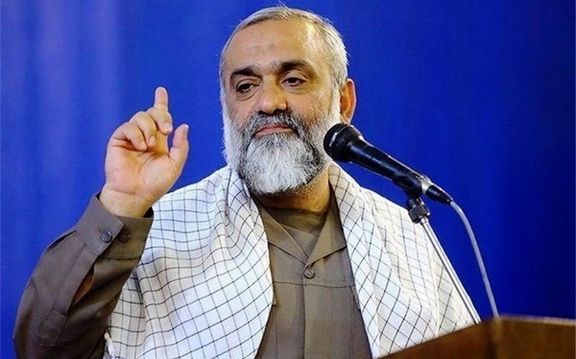
“The world understood how powerful the Islamic Republic is and how weakened America has become,” Naqdi said during an appearance on Iranian state television. However, he added, “America has not yet received its full answer.”
The Ayn al-Asad missile strike occurred on January 8, 2020, as a direct retaliation by Iran for Soleimani's killing. The Islamic Revolutionary Guard Corps (IRGC) launched over a dozen ballistic missiles targeting the airbase in Iraq, which housed US and coalition forces. Another strike targeted a base near Erbil. This marked the first direct Iranian attack on US forces in decades and was one of the most significant escalations in US-Iran tensions.
The strike resulted in no immediate fatalities among US personnel, reportedly due to early warnings and evacuations.
Iran; however, portrayed the attack as a demonstration of its military capability and resolve.
Naqdi also defended Iran’s extensive role in the Syrian conflict, where Soleimani played a pivotal part in mobilizing Shi’a militias to support President Bashar al-Assad.
“Our presence in Syria was the most rational decision, as we sought to remove a significant threat to the Islamic Ummah,” Naqdi added, referring to Iran’s fight against ISIS.
Brigadier General Asghar Arabpour from Isfahan province also urged Iranian leaders to intensify efforts to hold Trump accountable.
“Addressing this case and Trump’s crimes requires greater seriousness from our country’s officials,” Arabpour said in an interview with ISNA.
He also criticized the broader US foreign policy under both Trump and President Joe Biden, arguing that American administrations prioritize Israeli security at the expense of Middle Eastern stability.
Five years after Soleimani’s targeted killing, Iran officials occasionally speak of revenge, keeping his death a cornerstone of their rhetoric against the United States.
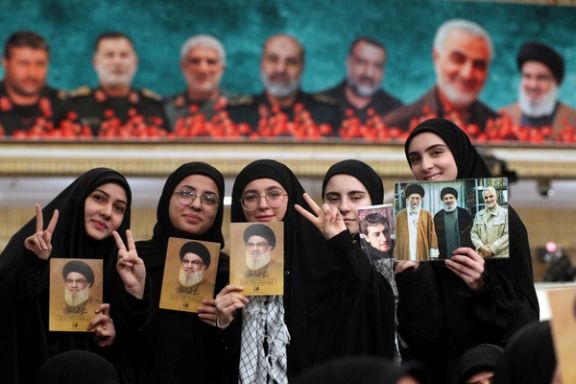
Iranian Supreme Leader Ali Khamenei defended Iran's involvement in Syria's civil war and his policy of power projection in the region, dismissing criticism of the country’s diminishing influence in the Middle East.
“Some people, due to a lack of proper analysis and understanding, claim that with the recent events in the region, the blood shed in defense of the shrine was wasted,” Khamenei said in a Wednesday ceremony to mark the fifth anniversary of the death of former Revolutionary Guards Quds Force commander Qasem Soleimani.
He was Iran’s most influential figure in coordinating armed allied groups in the region and was killed by the US in Iraq in 2020.
“They are making this grave mistake; the blood was not wasted,” Khamenei continued.
The defense of the shrine refers to a narrative promoted by Iran as a reason for its military presence in Syria and Iraq. This concept centers around the protection of Shi’a Islamic holy sites, particularly the Shrine of Sayyida Zainab in Damascus, Syria. Sayyida Zainab was the granddaughter of Prophet Muhammad. However, following the October 7 Hamas attack on Israel, Khamenei’s rhetoric expanded beyond shrine defense, openly advocating an all-out war against Israel.
The comments by Khamenei follow a series of regional setbacks for Iran in 2024, as its network of proxy and allied groups faced regular Israeli countermeasures.
Hamas's military power has been almost completely diminished by Israel. Israel has also intensified its campaign against Hezbollah with precise airstrikes, covert operations, and intelligence-led targeting of the group's assets in Lebanon and Syria. These actions aim to degrade Hezbollah’s capabilities, disrupt its supply lines, and prevent the transfer of advanced weapons from Iran.
In Yemen, the Houthis encountered resistance from local factions, and devastating air attacks by Israel, the US and UK. These setbacks underscore the diminishing reach of Iran’s “axis of resistance,” a strategy central to Khamenei’s regional ambitions.
In Syria, a key pillar of Iran’s influence, the Assad government fell after 13 years of Iranian support. Since the Syrian Civil War began in 2011, Iran has heavily invested in preserving Assad’s government, seeing it as vital for maintaining access to Hezbollah and projecting power across the Levant. The loss of Assad unraveled these investments and severed Iran’s land corridor to Lebanon, undermining its ability to supply Hezbollah with arms.
Reclaiming Syria
Despite these challenges, Khamenei repeated his commitment to regional interventions on Wednesday, praising Soleimani for building pro-Iran groups across the region.
In a veiled reference to Syria's new strongman Ahmad al-Sharaa, Khamenei said: “Do not be deceived by this false show; those who are strutting around today will one day be trampled under the feet of the faithful. Those who have encroached on the land of the Syrian people will one day be forced to retreat in the face of the power of Syria's youth.”
This marks the third time Khamenei has promised to reclaim Syria from its new rulers. On December 11 and 23, he made similar vows, encouraging Syrian youth to resist Assad’s successors.
He also described Houthis and Hezbollah as symbols of resistance, adding that they would ultimately prevail. Without naming specific countries, he criticized certain nations for “sidelining their faithful youth,” whom he called “pillars of stability and strength,” warning that they risk facing Syria’s fate.
Iran International analyst Morad Veisi suggested that Khamenei’s rhetoric reflects a refusal to accept regional realities. “Rather than acknowledging his mistakes, he attempts to reshape facts to align with his vision,” Veisi said, adding that this approach has drained Iran’s resources and alienated its neighbors.
These remarks coincide with admissions by Hezbollah’s Secretary-General Naim Qassem, who acknowledged that Assad’s fall has disrupted the group’s primary supply route through Syria. Meanwhile, The New York Times reported that Assad’s downfall has caused confusion among Iranian officials.
Khamenei also praised Soleimani, saying that he utilized the potential of the region's youth to revive the Resistance Front. However, his statements contrasted with a prior speech in which he denied that Iran operates proxy forces in the region.
As Iran’s influence wanes and its regional allies face mounting challenges, Khamenei’s insistence on reclaiming Syria underscores the strain on the Islamic Republic’s strategy.
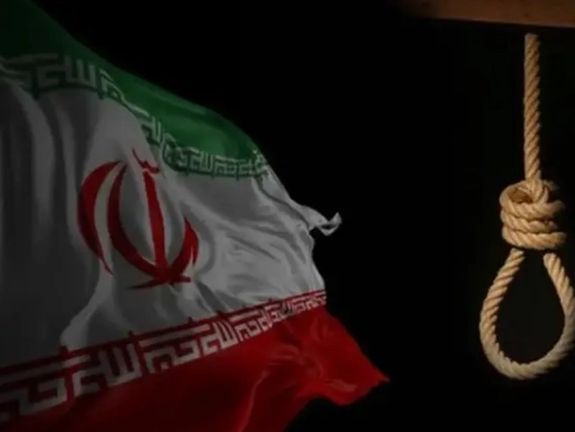
Iran witnessed a stark rise in executions this year, with at least 930 death sentences carried out, according to the Washington-based Abdorrahman Boroumand Center for Human Rights in Iran.
The figure for years 2023 and 2022 were 811 and 579 respectively, which shows an alarming upward trend.
“The international community must adopt a unified, consistent, transparent and effective response to protect those targeted and hold Iran, and other countries following its example, accountable,” read the report by Boroumand center on Tuesday.
Many death sentences are drug-related and are handed and carried out with relative ease, sparking criticism from human rights organizations that suggest the rise in executions may aim to intimidate the populace amid ongoing unrest.
Prominent voices have called for urgent international action. Nobel Peace Prize laureate Narges Mohammadi, in an open letter to UN Secretary-General António Guterres, urged the global body to demand that Iran halt its mass executions as a condition for any negotiations.
The cases of individuals executed on charges of political dissent have drawn particular scrutiny.
In August, Iran executed Reza Rasaei, arrested during the 2022 Woman, Life, Freedom protests, for allegedly murdering an intelligence officer. In October, Iranian-German dual national Jamshid Sharmahd was executed following a trial Amnesty International denounced as grossly unfair.
Iran’s increasing reliance on capital punishment has been met with widespread condemnation, with human rights organizations reiterating calls for the abolition of the death penalty.
As 2024 concludes, Iran’s judicial practices remain under close scrutiny from the international community, which continues to advocate for accountability and the protection of fundamental rights.

Record number of Iranians left the country in 2024 to study abroad as the country's youth lose hope in change, according to a report carried by Iran's official news agency IRNA.
The number of Iranian students in the ten main destinations has almost doubled in four years, from 60,000 to 110,000, reflecting the nation's ongoing economic woes.
In previous decades, the number of Iranians studying abroad doubled every ten years.
"This trend is not just about education but reflects broader socio-economic factors pushing skilled individuals out of the country,” IRNA quoted migration analyst Bahram Salavati saying.
“In addition to surpassing the critical threshold of 100,000 Iranian students abroad, the list of primary destinations and the growth rates in these countries are particularly striking,” Salavati added.
Turkey has emerged as the leading destination, hosting nearly 30,000 Iranian students in 2024,a staggering 158% increase since 2020. Turkey's proximity is a key factor. It's also cheaper and easier to enter compared to most Western countries.
Other popular destinations for Iranian students include Canada, Germany, Italy, and the United States.
The sharp rise in student migration is closely tied to the worsening of living conditions and shows no sign of slowing despite repeated calls and warnings by Iranian officials.
The latest came from Iran's vice president Mohammad Reza Aref, who asked Iranian professionals overseas to return. "Iran is your homeland and home, and we welcome you to serve your country in the fields of science and technology," Aref said on Tuesday.
Iran’s migration policies remain heavily focused on managing inbound refugees, such as Afghan nationals, and little appears to be done beyond words to control the "brain-drain" or incentivize returns.
In 2022, the Iran Migration Observatory (IMO) reported that the country ranked 17th globally for students studying abroad. With the trend showing no signs of slowing, analysts warn that Iran’s economic and social stability could face even greater challenges without urgent intervention.
Fatemeh Mousavi, a sociologist and social researcher, said the exodus shows a lack of faith in Iran's trajectory among its youth.
“The 140% increase in the migration of young professionals in the past year alone can be seen as an exit strategy resulting from the loss of hope in change and reform in the government,” Mousavi told the Tehran-based outlet Khabar Online.


